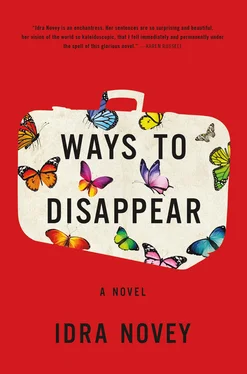Raquel asked how much something like that would cost.
Mulher, please. He won’t charge you, Thiago told her. The man is family, and he owes me a favor.

Emma stepped into the one clean dress she had left. She put on the filigree earrings she’d picked out online for Miles to buy for her last birthday. She used up her hand cream and trimmed her cuticles, grooming herself like a high school girl because it filled the minutes and she was rather inebriated, but also because she could not decide about Marcus’s things, whether to hide them in the closet.
Until now, she’d been stepping around the red snug-fit boxers Marcus had left on the floor. They were still balled up with one of her sweaty unwashed dresses. She had also yet to touch his backpack, which was still open and leaning against the side of the bed. With each hour he’d been missing, his things and how he’d left them had accrued more meaning. She didn’t know if she could betray their location for Miles’s sake.
In translation, this kind of dilemma was known as domestication. A translator could justify moving around the objects in a sentence if it made it easier for her audience to grasp what was going on. She could even change an object into something more familiar to the reader to avoid baffling him with something he wouldn’t understand. It often occurred with food — with a fruit, for example, that the reader wasn’t likely to recognize and therefore whose sweetness he could not imagine.
The problem with domesticating things this way, however, was the possible misplacement of truth. Emma had made a practice of keeping this dilemma out of mind, of trusting that she was experienced enough now to intuitively know what could be moved and what couldn’t — when the location of an object was, in fact, its meaning.
Which is perhaps why she tripped over the boxers and hit her face on the dresser when Miles knocked on the door.

Jesus, Emma, are you all right?
Miles lifted her chin to see where the blood was dripping from, if it was from her forehead or closer to her eye. You smell like a distillery, he said. How much have you been drinking here?
Emma pushed past him into the bathroom, her hand over her face. Even with pressure, there was enough blood to pink the towels and the water pooling in the sink. She didn’t feel much pain, although after four caipirinhas she wasn’t feeling much of anything.
Let me see it. Miles hovered over her in one of his baggy Adidas T-shirts. He was so much taller and more intentional, so much more determined to be right. She didn’t want him to declare the degree of her injury, even if the concern in the set of his mouth was genuine. Or just familiar. Or the familiar thing was more the smell of his aftershave.
It’s definitely stopping, he said, but your eye’s swelling up. Have you been drinking like this the whole trip? No wonder you’ve lost all sense of reality.
Miles, please. Just stop. She tried to back away from him but the toilet was right behind her.
But I don’t understand what’s going on, he said. If you think getting married means we have to have kids right away, we—
Because everything comes down to having children, right? You’re just like your mother. You reduce everyone to that one decision. You think you have everyone figured out that way, but you don’t. It’s just your own toxic righteousness. I can’t stand it! She pushed against him, through him, whatever she could do to get out of the bathroom. But he stayed pressed up close to her, denying her accusations, until they were out of the bathroom and had reached the red boxers balled up with her sundress on the floor.
Whose are those?
Marcus’s.
Her son’s?
Emma watched the muscles around his mouth tighten as he scanned the room, looking for other evidence of her betrayal. And it was there: the open mouth of Marcus’s backpack, his green-striped beach pants by the bedside table, one of his sweaty shirts on the floor.
Miles started to bend over and Emma lunged to retrieve the backpack before he could reach into it, but that wasn’t what he was after. He grabbed the notebook off the bed and held it up.
Is that prick a writer now, too? he yelled at her. Is that why you’re sleeping with him? So he’ll let you translate him next? You’re fucking pathetic, Emma.
He doesn’t write. It’s mine. She reached for the notebook but Miles held it higher, out of her reach.
What do you mean, yours? Can’t you see you’re sabotaging yourself for things you didn’t even write? Who even cares about these weird stories? I mean, come on.
With the book still above his head, he flipped to a page and tilted his head up to find something to read back to her. She scrambled onto the bed to grab the notebook but he moved away.
On the bedside table, the hotel phone rang and startled them both. It was Raquel calling with the news that Flamenguinho was going to return Marcus in an hour. If you want to be there, she told Emma, you need to get in a taxi now.
In all the confusion, Emma saw that Miles had lowered the notebook, and she grabbed it. Could you spell the street? she asked Raquel, writing down the street name just below the passage she had been about to finish, the eternal translator raising the mirror the court had finally placed in her hand.

To enter an alley in the dark.
To have to repeat this scenario and tell herself it was not the same. There was not just one way for a woman to enter an alley. She would not be the small gray mouse that meekly surrenders to the jaws of the snake. Thanks to Thiago, this time would be different. If you have to use it, use it, he had told her. The bullets in it aren’t traceable.
In her hotel room, Raquel pulled out the gun one last time and felt a comfort at its heaviness. For a second, she gently ran the muzzle along her arm. Blushing, she nestled it back in her purse.

Emma opened the door with her sandals unbuckled. She couldn’t bother with the clasps now, not with Miles pushing at the door, telling her if she left the room now it was over.
I came all this way, he said.
She told him she had also come a long way, that she was sorry she had gone in a different direction. She told him she felt ashamed to be doing this to him. They’d run alongside each other for five years, matching each other’s breath for the considerable length of their fading industrial city. To breathe that hard next to someone for so great a distance had felt radical. Yet as often occurred with radical endeavors, the runs became oppressive. After a certain point, they stopped laughing and no longer paused to watch the birds on the bridge. They never lingered in bed instead of running, never read to each other. They’d just kept at it, harder, stopping only to hydrate or for an occasional ache. Emma knew she was likely leading herself toward other, more acute miseries, but she couldn’t consider them now.
I’m sorry, Miles, I really am, she said one more time as she closed the door from the hallway.
In her absence, Miles didn’t know what to do. He thought of the slightly tilted porch in front of their house. Of their mailman, Alton, arriving each day and slipping their catalogs and bills through the slot in their door. Of their cats, restless and lonely, tracking over the growing mound of mail. Emma couldn’t mean it. If he could just persuade her to leave here, she would recognize that immediately.
Читать дальше













